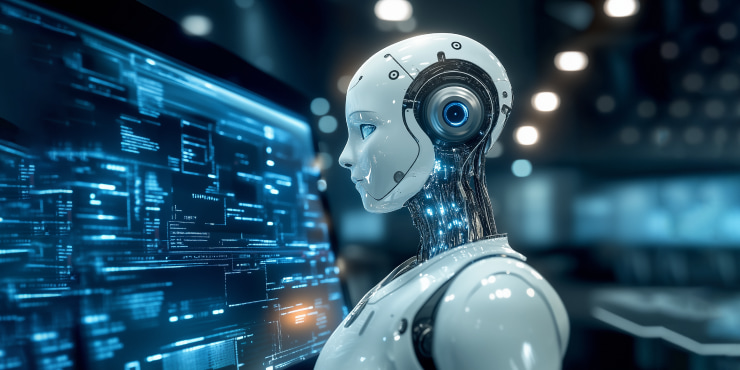The Strategic Revolution: Machine Learning in Business

Imagine a world where companies predict what you'll buy before you even think about it. In this world, customer service is instant and personalized, and decisions are made with incredible accuracy.
Today, this isn't science fiction; it's the power of machine learning (ML). And it's rapidly changing the business arena. Forget gut feelings and outdated spreadsheets. ML allows computers to learn from massive amounts of data. They can find patterns humans can't see and make smart predictions. This revolution isn't just about fancy algorithms; it's about gaining a real competitive edge.
From streamlining operations to understanding client behavior, AI and machine learning in business are changing how companies:
- Operate
- Innovate
- Thrive
This guide explores how companies are leveraging this technology, the challenges they face, and the exciting future it promises. Learn how ML can transform your business strategies.
The Fundamentals of Machine Learning in Business
ML is a way for systems to learn from data without being explicitly programmed. Think of it like teaching a dog a new trick. You don't tell the dog exactly how to do it step-by-step. Instead, you show them what you want them to do, reward them when they get close, and correct them when they go wrong. Over time, the dog learns. ML works in a similar way. We feed systems tons of data, and they learn to:
- Recognize patterns
- Make predictions
- Improve their performance over time
This is different from the usual data analysis. Traditional analysis often involves humans manually examining data, trying to find relationships and testing hypotheses. It's like carefully examining a map to plan a route. ML, on the other hand, is like having a GPS. It uses data to automatically find the best route, even if you don't understand all the details of the map.
There are a few main types of machine learning in business processes:
- Supervised learning. This is like having a teacher. We give the system data with correct answers. And it learns to predict the answers for new data. For example, we might give it pictures of cats and dogs, labeled accordingly. And it learns to tell the difference between them.
- Unsupervised learning. This is like exploring on your own. We give the device data without any labels. And it finds patterns and groupings on its own. For example, it might find different groups of clients based on their buying habits.
- Reinforcement learning. This is like learning through trial and error. The system learns by taking actions and receiving rewards or penalties. For example, it might learn to play a game by trying different strategies and seeing which ones lead to victory.
Big data plays a crucial role in machine learning business models. The more data the device has, the better it can learn. Think of it like reading more books to become smarter. Artificial intelligence (AI) is a broader concept that includes ML. AI aims to create smart machines, and ML is one important tool for achieving that goal. In modern business, big data and AI, powered by ML, are transforming how decisions are usually made. Instead of relying on guesses or intuition, companies can now use data to make informed choices.
How Businesses Leverage Machine Learning
Companies are using AI and machine learning for business in many different ways:
- Client behavior analysis. ML can help companies understand what clients want. They can predict what they will buy and personalize their experience. For example, it can recommend products you might like based on your past purchases.
- Fraud detection. ML can find suspicious patterns in transactions to prevent fraud. For example, it can flag unusual credit card activity.
- Process automation. ML can automate repetitive tasks. It frees up employees to focus on more important work. For example, it can automate the process of sorting emails.
Here are some real-world examples:
- Netflix uses ML to recommend movies and TV shows you might enjoy.
- Amazon uses ML to personalize product recommendations and optimize its supply chain.
- Banks use ML to detect fraudulent transactions and assess credit risk.
Key Benefits of Machine Learning for Businesses
ML offers many benefits to business:
- Improved efficiency. Automating tasks and optimizing processes leads to increased efficiency.
- Cost reduction. By automating tasks and making better decisions, companies can reduce costs.
- Predictive capabilities. Machine learning can predict future trends and allow businesses to make proactive decisions.
- Data-driven decision-making. ML enables businesses to make decisions based on data rather than gut feeling.
- Improved customer experience. Personalization and targeted offers lead to a better client experience.
- Risk assessment. ML can help companies assess and manage risks more effectively.
In short, ML is a powerful tool that is transforming the business world. It allows companies to gain a deeper understanding of their clients, optimize their operations, and make better decisions.
Industry-Specific Applications of Machine Learning

Now, let’s take a look at how machine learning and artificial intelligence technologies help businesses. It’s changing how many different industries operate. Here are some examples.
Finance:
- Fraud detection. Imagine a program that can spot unusual credit card activity faster than any human. ML does this by learning what normal spending looks like and flagging anything out of the ordinary.
- Risk assessment. Banks use ML to figure out how likely someone is to repay a loan. This helps them decide who to lend money to and at what interest rate.
- Algorithmic trading. Systems can use ML to buy and sell stocks automatically, based on market trends and predictions. This can be much faster and more efficient than human traders.
Healthcare with Machine Transformation:
- Disease diagnosis. ML can analyze medical images, for example, X-rays and MRIs. It helps doctors diagnose diseases like cancer earlier and more accurately.
- Drug discovery. Developing new drugs is a long and expensive process. ML can speed it up by predicting which compounds are most likely to be effective.
- Personalized medicine. ML can help doctors tailor treatments to individual patients based on their genetic makeup and medical history.
AI in Business Operations: E-commerce:
- Personalized recommendations. Ever wonder how Amazon seems to know exactly what you want to buy? ML powers those personalized product recommendations.
- Customer segmentation. ML helps e-commerce companies group clients based on their preferences and buying habits. It allows for targeted promotional campaigns.
- Price optimization. ML can help businesses set the optimal price for their products based on demand, competition, and other factors.
Business Machine Learning: Manufacturing:
- Predictive maintenance. ML can analyze data from machines to predict when they are likely to break down. It allows for preventative maintenance and reduces downtime.
- Quality control. We can use ML to inspect products on the assembly line and identify defects, improving product quality.
- Supply chain optimization. ML can help companies manage their supply chain more efficiently by predicting demand and optimizing logistics.
Challenges and Limitations of Machine Learning in Business
Machine learning in business operations offers many benefits. However, companies also face several challenges and limitations when implementing this system.
Ethical Concerns, Data Privacy, and Regulations:
- Bias in data. ML models learn from data. And if that data reflects existing biases, the model will also be biased. This can lead to unfair or discriminatory outcomes. For example, a hiring algorithm trained on historical data might unfairly favor male candidates.
- Data privacy. Machine learning in business processes often requires large amounts of data. Businesses must ensure they are collecting and using this data responsibly and ethically. Protecting client privacy is crucial. Companies must comply with regulations like GDPR.
- Lack of transparency. Sometimes, it's hard to understand how an ML model arrives at a particular decision. This lack of transparency can make it difficult to find and correct errors or biases. This is sometimes called the "black box" problem.
- Job displacement. As ML automates tasks, there are concerns about job displacement. Companies need to consider how to retrain and upskill their workforce to adapt to these changes.
AI and Machine Learning in Business: Cost and Expertise:
- High initial investment. Implementing ML can be expensive. It requires investment in hardware, software, data storage, and skilled personnel.
- Need for skilled professionals. Building and deploying models requires specialized skills. There is a shortage of data scientists and ML engineers. It makes it difficult and expensive to find qualified professionals.
- Ongoing maintenance. ML models require ongoing maintenance and updates to ensure they remain accurate and effective. This can be a significant cost for companies.
Machine Learning Business Model: Implementation Pitfalls:
- Lack of clear objectives. Before implementing ML, businesses need to define clear objectives. What problems are they trying to solve? What are their goals? Without clear objectives, it's easy to waste time and resources.
- Poor data quality. ML models are only as good as the data they’re trained on. If the data is incomplete, inaccurate, or inconsistent, the model will perform poorly. "Garbage in, garbage out" is a common saying in ML.
- Overfitting. Sometimes, an ML model becomes too complex and learns the training data too well. It’s called overfitting, and it means the model will perform poorly on new, unseen data.
- Resistance to change. Implementing ML often requires changes to existing processes and workflows. Employees may resist these changes, making it difficult to successfully implement the system.
The Future of Machine Learning in Business

The future of machine learning in business operations looks bright, with exciting advancements on the horizon. Here's a glimpse into what we can expect.
AI-Driven Automation and Deep Learning:
- Smarter automation. We'll see even more sophisticated automation powered by AI. Imagine bots not just performing simple tasks. They are also making decisions and adapting to changing circumstances. This will lead to increased efficiency and productivity in many industries.
- Deep learning breakthroughs. Deep learning, a type of ML inspired by the human brain, will continue to advance. This will lead to improvements in many areas. These include image recognition, NLP, and speech recognition. Imagine computers that can understand and respond to human language as naturally as humans do.
- Personalized experiences. ML will enable companies to offer even more personalized experiences to their clients. Imagine shopping experiences tailored to your needs or healthcare treatments designed for you.
Machine Transformation: Explainable AI and Quantum Computing:
- Explainable AI (XAI). As ML becomes more powerful, it's important to understand how these models make decisions. XAI aims to make AI more transparent and understandable, so we can trust and rely on its outputs. This will be crucial for building trust in AI systems and ensuring they are used responsibly.
- Quantum computing. This is a new type of computing. It has the potential to change many fields, including ML. These systems could solve problems that are currently impossible for even the most powerful supercomputers. It opens up new possibilities for ML. Imagine ML models that can analyze vast amounts of data in the blink of an eye.
Long-Term Impact and Final Thoughts:
- Transformation of industries with machine learning. ML will continue to transform industries across the board, from manufacturing and healthcare to finance and retail. Companies that embrace ML will be better positioned to compete and succeed in the global economy.
- New job opportunities. This is another way that machine learning and artificial intelligence help businesses. Some jobs may also be automated. However, ML will also create new job opportunities in areas like data science, AI, and ML development. The workforce of the future will need to be skilled in working with AI and ML systems.
- Ethical considerations. As ML becomes more powerful, it's crucial to address the ethical implications of this technology. We need to ensure that AI is used responsibly and that its benefits are shared by everyone. This includes addressing issues like bias, data privacy, and job displacement.
In the long term, AI in business operations will have a profound impact on global industries and society as a whole. By embracing the potential of this system while addressing its challenges, we can create a future where ML benefits everyone. The journey of ML is just beginning, and the possibilities are endless.


